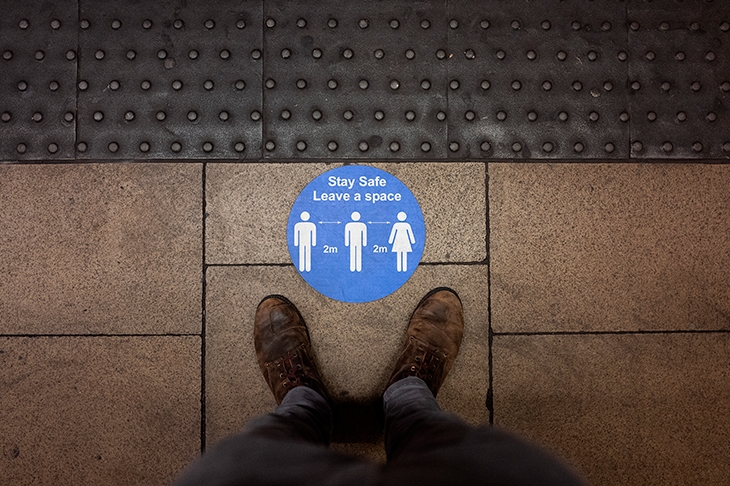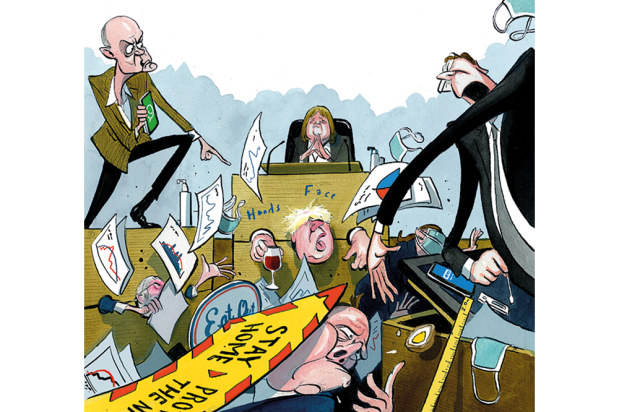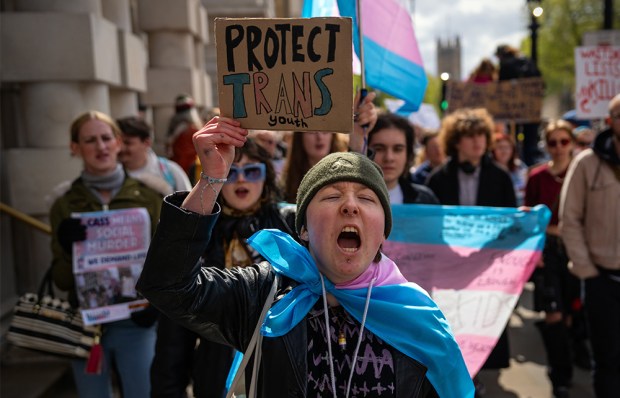We have reached Covid-19’s first anniversary in the UK — and I really think we should do something fitting to mark the occasion. The actual date is pretty much a moveable feast. The first patient in the UK known to have died of the disease was Peter Attwood, aged 84, on 30 January. But we didn’t know then that he had Covid, finding out only about six months later. On 4 February, the government instructed all Brits living in China to get the hell out and return to the UK sharpish and breathe all over us, as I believe the press statement had it. On 11 February, the little baby was actually christened Covid-19.
Perhaps we should commemorate the anniversary of something more down-home and folksy. The first time you had to clean your bottom with the lid from a sardine can because hordes had stockpiled all the lavatory paper, for example? Or the very last time you used a cash machine? The first time Matt Hancock addressed us as if we were disobedient puppies? The first time Professor Neil Ferguson got his hyperbolic calculator out? Maybe we should vote on it. Whatever, I think we should sacrifice a goat or something out of respect to the change this smallish parasite has wrought on the country. It might bring us all together.
Or maybe not: Covid was delivered to us largely through Londoners, freshly returned from their skiing trip in Italy, or from taking Oli, six, and Poppy, four, to see the Great Wall. For quite a while London was the only place affected (especially SW1). But Covid had its most lethal effects upon Brexiteers — the poor, the elderly and especially poor and elderly northerners. We Leavers had spotted one or two downsides to globalisation a long time before some bloke called Wu Han decided to make a rich and nutritious soup from the spleen of a pangolin and shortly after dropped dead. Ironic, then, that it was the Leavers who eventually bore the brunt of Covid’s attack.
I have long wondered what would have happened if this pandemic had occurred at some other point during the past 50 or so years, rather than now, and how differently we might have coped. In a certain sense the question is otiose because while Covid might well be ‘defeated’ (or checked) by our modernity, it was also of course partly a consequence of it. It might not have reached here in 1978, for example, when only a couple of hundred thousand tourists from around the world visited China each year and were kept well away from the locals. By the time the virus struck, the number was closer to 50 million a year. Even by 1990 the number travelling there was only a couple of million — but then we weren’t travelling very much anywhere, compared with today. The World Bank reckons about a billion passengers were flown in 1990: this figure went on to quadruple. Covid and its entertaining mutations have been facilitated by our eagerness to see the world, an addiction we are reluctant (even now) to shake off.
But then there is this. In 1990 few people had mobile phones, which were in any case limited and inefficient, and even fewer had a computer at home. Over the course of the past year most businesses have remained functioning as a consequence of home-working, a resort not available to businesses in 1990 and still less in 1978. Further, while we have had flu vaccines for the best part of a century, the rapidity with which we can now produce them is a recent development. The government’s strategy, then, of applying lockdowns and tiers of restrictions while waiting for a vaccine to become available would have been unimaginable 30 years ago. My suspicion is that if the virus had struck at either of those times, there would have been no lockdown and the government would have been inclined to play down the risk from the disease.
The obvious conclusion is that there would have been considerably more deaths in earlier years — and yet even this is open to question, partly because we do not know yet how many people have been killed as a consequence of lockdown, but partly too because back then (and particularly in the 1970s) we needed very few injunctions about travelling within the UK. By and large, we stayed put. Even in 1990 we were more likely to do our shopping locally and travelled less, hither and thither, across the country. The figures may well have balanced themselves out.
These hypotheses might seem facile, but I mention them because of what it says about our response this time around. Again, if we did not have the ability to work from home, as many of us do, I reckon the government would never have contemplated lockdown. In other words, the government’s response to this crisis has been contingent: it has not been simply ‘we must save every life we can’. It does not quite buy into the belief shared by an apparently large proportion of the population that nobody must ever die from anything. Tiers and lockdowns are a hedged bet made possible through new technology. The morality hasn’t really altered.
Perhaps instead of commemorating the arrival of Covid to these shores, we should instead celebrate the resurrection of that most de trop of notions, the nation state. Never has it seemed such an agreeable system of governance. It is not simply that the lumbering idiots of the European Union ballsed up their vaccine programme and were reduced to making fantastical threats against the UK out of pique and bitterness, but also that the ability to have control over one’s borders must surely seem to even the most committed internationalist not an expression of xenophobia but a sheer necessity. If only we had actually used that newly regained control when it mattered.a
Got something to add? Join the discussion and comment below.
Get 10 issues for just $10
Subscribe to The Spectator Australia today for the next 10 magazine issues, plus full online access, for just $10.
You might disagree with half of it, but you’ll enjoy reading all of it. Try your first month for free, then just $2 a week for the remainder of your first year.















Comments
Don't miss out
Join the conversation with other Spectator Australia readers. Subscribe to leave a comment.
SUBSCRIBEAlready a subscriber? Log in